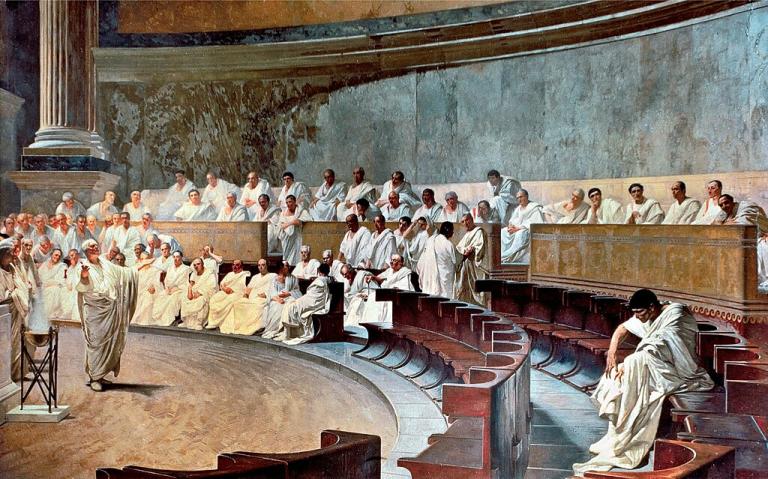A Roman re-enactor posted a reel on Instagram that posed this challenge: “Ladies, many of you do not realize how often men think about the Roman Empire,” going on to urge women to ask their husbands, boyfriends, brothers, and fathers.
So a skeptical woman on TikTok asked her husband that question, and he replied “every day.” That went viral, as did other women asking other men, and it turned out that men, do, in fact, think about ancient Rome pretty often, “at least three times a week,” according to a news story about the phenomenon.
This has sparked all kinds of speculation about the appeal of Roman masculinity and patriarchy. But the specific examples I’ve heard cited seem to refer more to the “fall of civilization” trope. We see something decadent and outrageous–which may happen multiple times daily–and that triggers a comparison to the “decline and fall of the Roman empire.”
As in one man quoted in the article who said he thought about what happened to the Roman Empire when “I saw someone drinking coffee from a plastic bag which must indicate the US empire is in late stage.” That’s a light example, but there are far more alarming reasons–sexual depravity, infanticide, loss of religion, failures of government, the national debt, escapist entertainment in the face of impending catastrophe (i.e., fiddling while Rome burns)–that can make us think that the Barbarians have burst through the gates.
As for me, I’ve been thinking about Ancient Rome multiple times a day, but that’s because I’m studying classical education and reading up on the Early Church.
But what we need to think about the most is not the fall of the Roman Empire, but the fall of the Roman Republic. That is where the most immediate parallels lie, and what we most need to worry about. The rise of the Roman empire–a globalist authoritarian tyranny–brought about the fall of the Roman Republic, a system of representational government and political liberty that was a model for American Constitutionalism.
I’ve said that before, but the topic deserves more attention, especially since ancient Rome is on everybody’s mind today. (Well, on men’s minds.)
The Roman Republic lasted for 482 years, from when citizens overthrew their king in 509 B.C. until Caesar Augustus seized power in 27 B.C. and began the Empire. Our American republic has so far lasted 234 years if we count from the ratification of our Constitution, which is less than half as long.
The structure of that Republic was complicated. (Read the Wikipedia article on The Constitution of the Roman Republic.) Roman society was tribal and hierarchical, divided between a “patrician” aristocracy and the “plebian” common people. Each group voted in their own assemblies for various kinds of magistrates and representatives. The Senate consisted mostly of patricians appointed by elected officials. Rome was not a democracy, but all male citizens–including the plebians–had a vote. My favorite feature of the Roman constitution was the office of Tribune, elected by the plebians to support the rights of the plebians. The Tribune could veto any law he considered detrimental to the common people or any action of a magistrate that he considered unjust to an individual citizen.
It was under the Republic that Rome had its greatest achievements. The Republic lasted through wars and internal conflicts. It gave this dynamic society mostly good and effective government for nearly 500 years.
What happened? Political corruption (sound familiar?). Economic problems the government couldn’t solve (sound familiar?). A rise in crime that the legal system with all of the rights it granted couldn’t control (sound familiar?).
But, above all, what happened was Julius Caesar. A charismatic leader and military genius, Caesar had been elected consul. But after his term, while Caesar was away conquering Gaul, his enemies resolved to prosecute him for crimes committed while in and out of office (sound familiar?).
Not wanting to be tried, Caesar returned and decided to “cross the Rubicon” with his army, that river marking Rome’s territory, which would by law make him an enemy of the state. The result was civil war. The plebians, though, supported Caesar, who made himself Dictator. But defenders of the Republic in the Senate assassinated him.
This led to another civil war, at the end of which Caesar’s nephew Octavian was victorious. He turned his uncle’s name into a title and gave himself a godlike name: Caesar Augustus.
Though elements of the Republic remained, Rome became an Empire, under the absolute rule of a single man who was acclaimed as a god.
Why do we Americans tend to think of the Roman Empire and not the Republic? It was not always this way. The Founders studied the Republic and tried to emulate it. A favorite play during our Revolutionary War–which Continental troops would sometimes perform in camp–was Joseph Addison’s tragedy Cato, about the great defender of liberty who battled Julius Caesar and who, in defeat, chose suicide rather than surrender. (This is why today’s libertarian think tank is named the Cato Institute.) The statesman, philosopher, and literary giant Cicero was killed in a purge carried out by Octavian and his associates after Caesar’s death.
Yet for most of us, democratic republicans though we be, Julius Caesar is the “good guy” and Brutus and the other assassins are the “bad guys.” This shows the power of literature over our imaginations. Shakespeare was a monarchist, and Julius Caesar comes out best in his much-studied-in-school play of that name.
Then there is Dante, a partisan of the Holy Roman Empire, who depicts the lowest circle of Hell, where those who betray their benefactors are punished, as a frozen lake, at the center of which is Satan, a grotesque three-headed parody of the Trinity, in whose three mouths he is eternally chomping on Judas and the two most prominent assassins of Caesar, Brutus and Cassius.
If you want a mesmerizing account of the late Republic and how it was overthrown, read Robert Harris’s Cicero Trilogy, a series of three extremely entertaining historical novels on the life of Cicero and his conflict with Caesar.
At any rate, think about the Roman Republic. At least three times a week. Women as well as men.
If we are more vigilant than we have been, perhaps our republic will last as long. If or when it declines and falls, it may well be for the same reasons that Rome’s did.
Illustration: Cicero Denounces Catiline in the Roman Senate by Cesare Maccari (1889), Public domain, via Wikimedia Commons














